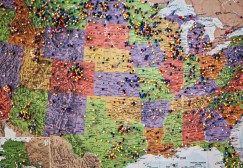GIS group plans push for national address database, next generation 911 expansion

ANNAPOLIS, Md. — State GIS leaders are planning major pushes in Washington, D.C., to encourage the development of the first publicly accessible database of every address in the nation and the expansion of next generation 911 technology, according to the president of the National States Geographic Information Council.
Chris Diller, head of the association representing GIS professionals around the country and GIS coordinator for Wisconsin’s Department of Military Affairs, laid out his group’s priorities for 2016 as NSGIC’s midyear conference wrapped up here Thursday.
As he prepared to head off to Capitol Hill with his fellow NSGIC members for a day full of meetings with lawmakers and staffers, Diller told FedScoop that fostering the creation of the National Address Database at the “top of our list” of goals for the coming months.
“We’re making a whole lot of progress in that area,” Diller said. “We’re very excited about moving forward on that.”
Indeed, earlier in the conference, officials with the U.S. Department of Transportation detailed their efforts to work with states to build the database, collecting geographic information on every address in the nation. Diller stressed that the construction of such a database was an essential effort for helping first responders make sure they’re heading to the right place when they get a call from a specific address.
Accordingly, he hopes not just to spread awareness about the importance of the project at the federal level but also to advocate for a piece of legislation he feels is a key part of the effort: the Geospatial Data Act of 2015. The bill, S.740, is sponsored by Sen. Orrin Hatch, R-Utah, and Sen. Mark Warner, D-Va.
It would codify into law the Federal Geographic Data Committee, a group of representatives from a variety of federal agencies that was established and subsequently renewed by a series of executive orders. The legislation would also create a National Geospatial Advisory Committee, made up of leaders from states, localities and the private sector to help create nationwide standards for how to format geospatial data.
“That particular act gives states a voice; it gives us a place at the table to be able to communicate our needs and requirements, and help guide that process,” Diller said. “So that to me is still a huge, huge thing we need to get done.”
[Read more: NASCIO urges Senate to move GIS data sharing bill forward]
With that input, Diller feels the committee could help make geographic data across the nation more standardized, making it easier for federal officials to compile it into the single address database. However, he isn’t optimistic that the bill has the momentum it needs to pass Congress before the polls close this fall.
“It doesn’t look like we’re going to get that through this Congress, but we’ll continue to press forward getting that for the next Congress once it gets going again and we get through the election cycle,” Diller said.
Diller hopes lawmakers come around on the bill, because he also believes it has major implications for the effort to modernize 911 systems around the nation. As states work to update their emergency communications networks to Internet protocol-based systems instead of analog ones, the importance of robust geographic data for addresses only increases, Diller said.
“It’s about saving lives and it’s about public safety, and if we can’t address that issue in a timely manner, then we’re doing a disservice to the public. So we need to be able to get there as soon as we can,” Diller said.
Diller noted that his group was planning on working closely with the National Emergency Numbers Association on the effort to help make the transformation to next-generation 911 a priority across the country. That group just joined with two other associations to form the “NG911 NOW Coalition,” a partnership to help make the technology the standard nationwide by the end of 2020, and Diller said NSGIC fully supports that push.
Indeed, he said his group would consider circulating model legislation at the state level to facilitate changes in statutes to enable the implementation of the technology. Yet he worries that funding remains a problem, especially because there’s “less awareness” about the issue at the federal level.
But he thinks the new coalition can make a big difference in filling that knowledge deficit, and he anticipates NSGIC undergoing a “transformation” in the coming months that can help it become more effective spreading the word as well.
Diller said he’s currently working to hire a new executive director for the group, with an announcement slated for the association’s annual conference in October, and the added leadership will undoubtedly guide NSGIC’s lobbying efforts on next generation 911 and other issues moving forward.
“It’s going to take a whole lot of advocacy by a whole lot of organizations to modernize these systems,” Diller said.
Contact the reporter at alex.koma@statescoop.com, and follow him on Twitter @AlexKomaSNG.






